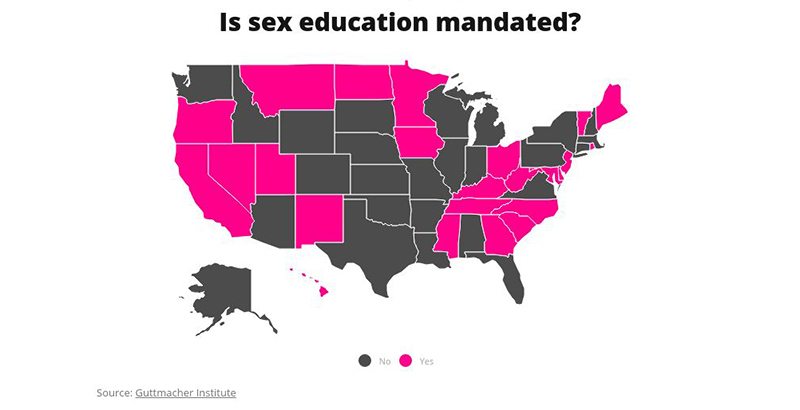Just 24 States Mandate Sex Education for K-12 Students, and Only 9 Require Any Discussion of Consent. See How Your State Stacks Up

Sex education is getting more attention in the wake of the #MeToo movement, particularly the need to teach students about consent.
What students learn about sex and sexuality during school varies widely from state to state and even from classroom to classroom. But this spring lawmakers in a handful of states are trying to pass bills to update their sex education policies to help students become more informed and better prepared to make good decisions.
Just 24 states mandate sex education in schools. Of those, only 10 require that it be medically accurate. Only nine require that it include consent.
One college professor in New Jersey estimates that 90 percent of her students arrive on campus poorly prepared and uninformed about their sexual health. Only 1 in 10 come having had “decent sex education,” said Eva Goldfarb, professor of public health at Montclair State University.
Goldfarb said her students are at risk for a range of social and health problems because of what they didn’t learn in sex education.
“They come really having a lot more physical experience than knowledge or understanding” about sex and sexuality, she said. That leaves them at risk not only for issues such as unwanted pregnancies and sexually transmitted infections, she added, but also for “things we don’t talk about that are just as important as those things, like not-good relationships, not-good sex.”
More than 90 percent of Montclair students are from New Jersey, a state that’s considered to have one of the most progressive sex education laws in the country, requiring medically accurate sex education that is “free of bias” and includes information about multiple means of contraception, healthy relationships and sexual orientation. Still, the New Jersey standards only mention consent one time and require teachers to stress abstinence.
“Sex education still remains a real patchwork with really big variability not only from state to state but also district building down to the classroom level,” said Nora Gelperin, director of sexuality education and training at Advocates for Youth, an organization that pushes for “honest sex education” that covers “sex, sexuality, relationships, contraception and condoms, and how to protect yourself and plan your future.”
That variability is one of the reasons lawmakers and activists are looking to update state policies.
At the opening of April, which is Sexual Assault Awareness Month, lawmakers in at least three states are considering bills related to sex education for K-12 students. Some would strengthen sex education requirements or make courses more comprehensive, while others intend to restrict what students can learn.
In Colorado, where sex education is not mandated, legislators have introduced a bill that would require that sex ed is medically accurate and include information about contraception in schools where it is taught — effectively banning the abstinence-only approach.
Oklahoma lawmakers are mulling a bill that would require districts to provide annual trainings to help parents learn how to talk to their children about sex.
Legislators in Alaska, where sex education is not mandated, have introduced a bill that would require sex education to focus on abstinence if it is taught and prohibit teachers from talking about contraception, sexual activity outside of marriage, homosexuality or gender expression.
Some sex ed bills are meeting resistance, however.
A bill known as Lauren’s Law that would have added instruction about healthy relationships failed in Oklahoma earlier this year. The Colorado bill also met resistance from Republicans.
Parents have been protesting this year in California, which passed a law requiring comprehensive sex ed in 2015. The law went into effect in 2016, and conservative groups argue that the new standards promote a political agenda and are not age-appropriate. As recently as last week the parent activist group Informed Parents of California rallied at the state capitol and spoke out against the new framework during a public committee meeting at the state education department.
Malachi Willis, a doctoral student at the University of Arkansas who has analyzed sex education policy, told The 74 that lawmakers can be reluctant to pass bills requiring consent education because there’s not much research on how to teach it effectively.
“It’s clear why we should include consent, but it’s not clear how,” he said. Other researchers have started to look into the effectiveness of some consent programs, Willis added.
While early research indicates that teaching students refusal skills can have a protective effect when it comes to sexual assault, Goldfarb said consent is just one part of a larger conversation that should also address how to deal with a partner saying “no.”
As the maps above show, students in many states are not required to receive sex education in their schools at all — and some adults aren’t in a hurry to change that, Goldfarb added.
“If you talk about refusal skills and negotiation skills,” she said, “then you have to acknowledge that sex is a possibility among adolescents.”
Get stories like these delivered straight to your inbox. Sign up for The 74 Newsletter

;)
